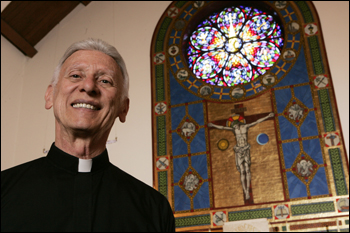At 68, Grandfather Starts New Life as a Catholic Priest
By Jeff Diamant/Religion News Service | Jun 01, 2007

ROCKAWAY, N.J.: After three blissful Italian vacations, the striking scenery of Italy's Amalfi Coast had settled snugly into Carmen Buono's memory. Glorious sunsets off the hotel balcony in Sorrento, the woman he loved—his wife, Barbara —at his side.
Then, in 2002, at age 63, Buono returned to Italy with friends, one of them a Franciscan monk. He again inhaled the coastal beauty, his heart aching as he thought of Barbara, who had died two years earlier. And he felt drawn, for the first time, to voice what had been on his mind for months.
He wanted to become a Roman Catholic priest.
The monk replied that Buono was too old to join the order. But once home in New Jersey, Buono spoke with the local diocese and in 2004 he entered a specialized seminary. Now, on Saturday (May 26), he will be ordained, becoming one of a small number of Catholic priests with children. And apparently the oldest new Catholic priest in the country.
The Church is ordaining 475 priests in the United States this year. Buono's age—he turns 69 on June 17—makes him an anomaly among priests even in a church where the ages of newly ordained priests have been rising. The average age is 35 this year, up from 28 in the 1960s and 26 in the 1940s. As a national shortage of Catholic priests has worsened, bishops have come to rely more on "second-career priests."
Buono, a retired therapist and public school principal, says he decided to become a priest because he wanted to exert his energy in a meaningful, spiritual way after his wife died. And while he liked dating, he did not want to remarry.
"I was committed to her in the marriage, as she was to me, and with that . . . not here all of a sudden, I knew I needed something more," he said. "And it directed me toward my vocation. I feel it (the priesthood) is absolutely the right thing for my life, because of . . . what had occurred."
Paterson Bishop Arthur Serratelli, who will ordain Buono and three younger men, says he is unfazed by the prospect of a priesthood starting at a time of life when most people contemplate retirement.
"Moses was 80 and Aaron was 83 when they were given their call," said Serratelli. "Look at the pope: He (Benedict XVI) took over running the church at 78.
"Age has changed. The way we look at age has changed. A lot depends on health, energy and commitment. . . . Like any new priest, he has to learn, but he has a lot to offer and he'll approach the ministry like a very zealous 68-year-old person. He's very energetic."
With the exception of a small number of still-married, formerly Anglican priests who chose to convert, the Roman Catholic Church mandates that its clergy remain celibate and not marry. And although once-wed men can be considered for the Catholic priesthood if they are widowed or their marriage is annulled, there are few children who hear their fathers tell them—as Buono told his two daughters four years ago at a Super Bowl party—that they plan to become a Catholic priest.
"I was surprised," said Danielle Smith, one of Buono's daughters, who like her sister, Carla, lives in Ringwood, N.J. "Definitely surprised. But not, in a way, because he's always giving to people. He's been in that field of counseling. . . . I'd be more surprised if he was dating somebody and getting married."
The news did spawn a question that has since thrived as a family joke: What will his two grandchildren call him after he's ordained—"Father Father"? (They've decided to stick with "Nonno," Italian for "Grandpa.")
Buono did not enter an ordinary Catholic seminary. He attended Blessed John XXIII Seminary in Weston, Mass., one of three specialized seminaries in the United States that let older men become priests in three or four years, in contrast to the standard five or six. (One of the other specialized seminaries, Sacred Heart of Jesus in Hales Corner, Wis., expects to graduate a 75-year-old man in 2008.)
The Rev. John Moriarty, Buono's spiritual director at the seminary, said: "People instinctively open up to him and trust him and sort of unburden themselves. Because of his background, he's probably better prepared than most priests would be. He's not thrown by the kind of problems that people might confide in him.
"Carmen . . . having been a widower, you suddenly find yourself saying: `I have time on my hands, I don't need to work, and yet I don't feel like my life is over. I'd like to do something that would contribute to helping other people improve the quality of their lives."'
Buono expects to be an associate pastor at a parish but will not know where until Serratelli assigns him and the other new priests. For now, he has been living in the little brick rectory of Sacred Heart of Jesus Church in Rockaway.
Buono said he retains amazement for what is a central task for any Catholic priest: consecrating bread and wine into the body and blood of Jesus. "I can't believe myself a man of God," he said. "But it's true. It's supposed to be true after next Saturday. The thing I'll be ordained to do is awe-inspiring, to me. Who am I to do that?"
Jeff Diamant writes for the Star-Ledger in Newark, New Jersey.















